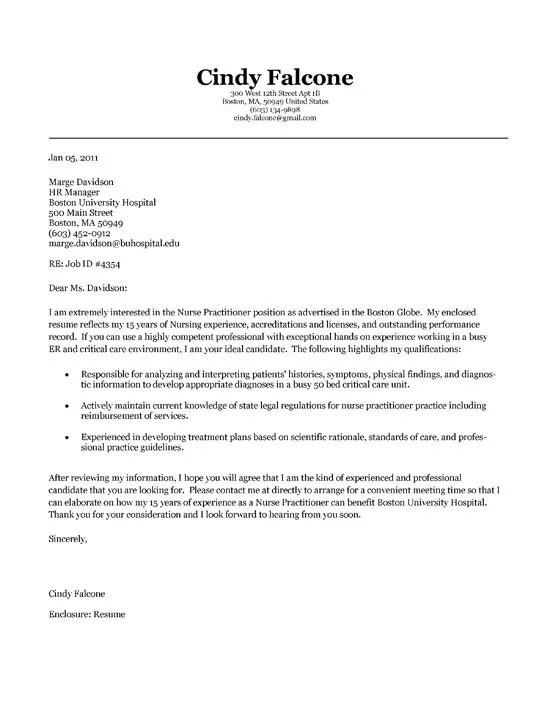Crafting a Powerful Nursing Resume Cover Letter
As a new graduate nurse, landing your first job can feel overwhelming. You’ve invested years in education and clinical experience, and now you need a compelling cover letter to showcase your potential. A well-crafted nursing resume cover letter is your opportunity to make a strong first impression and distinguish yourself from other applicants. This guide will provide you with the secrets to crafting a powerful cover letter that grabs the attention of hiring managers and increases your chances of getting hired. We’ll cover everything from the essential elements to common pitfalls, ensuring you present yourself in the best possible light and effectively communicate your skills and enthusiasm for nursing.
Understanding the Importance of a Cover Letter
Why is a cover letter so crucial, especially for new grads? Simply put, it’s your chance to tell a story beyond the bullet points on your resume. It allows you to explain your career goals, highlight your relevant experiences, and express your passion for nursing in a way that a resume alone cannot. For new graduates, a cover letter is a critical tool as it helps to bridge the gap between your limited direct experience and your eagerness to learn and contribute. It’s also an opportunity to demonstrate your communication skills and attention to detail, both of which are vital in the healthcare field. A strong cover letter shows you’ve put in the extra effort and are serious about the position.
Highlighting Key Skills
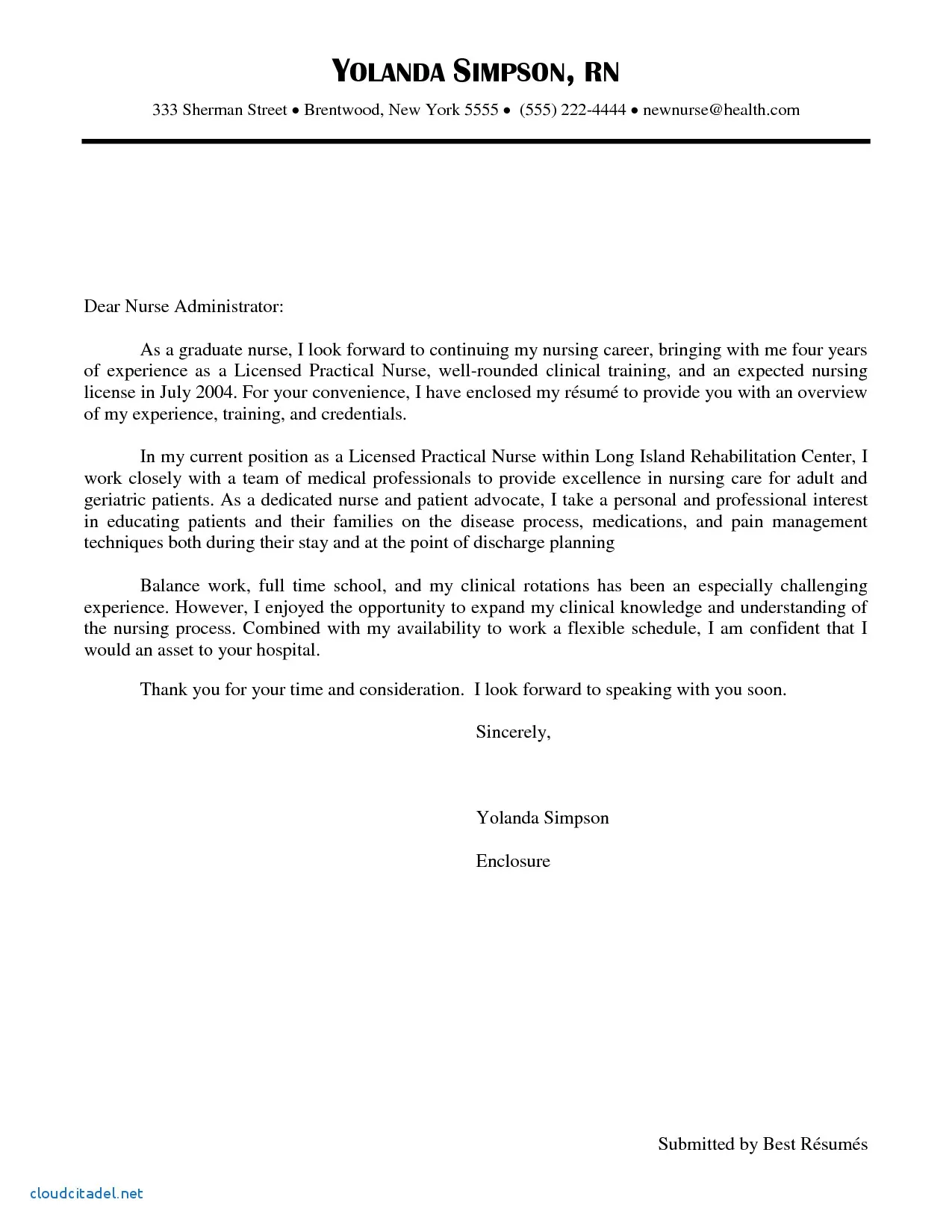
Your cover letter is the perfect place to showcase your key skills. These aren’t just clinical skills like medication administration or wound care; they also include soft skills such as communication, teamwork, and critical thinking. Highlight specific instances where you’ve demonstrated these skills during clinical rotations or volunteer experiences. For instance, describe how you successfully collaborated with a healthcare team to improve patient outcomes or how you resolved a conflict with a patient or their family. Quantify your achievements whenever possible, such as the number of patients you cared for or the positive feedback you received from supervisors. This provides concrete evidence of your abilities and makes your letter more impactful.
What Recruiters Look For
Recruiters and hiring managers are looking for more than just a list of qualifications. They want to see that you’re a good fit for the organization and the role. They’ll be evaluating your cover letter for your understanding of the role, your writing skills, and your overall professionalism. They want to see that you’ve researched the hospital or clinic and understand their mission and values. Expressing genuine enthusiasm for the position and the organization is key. Demonstrate your understanding of the job description and clearly articulate how your skills and experiences align with the requirements. Highlight any unique experiences or certifications you have that set you apart from other applicants.
Essential Elements of a New Grad Cover Letter
Contact Information and Salutation
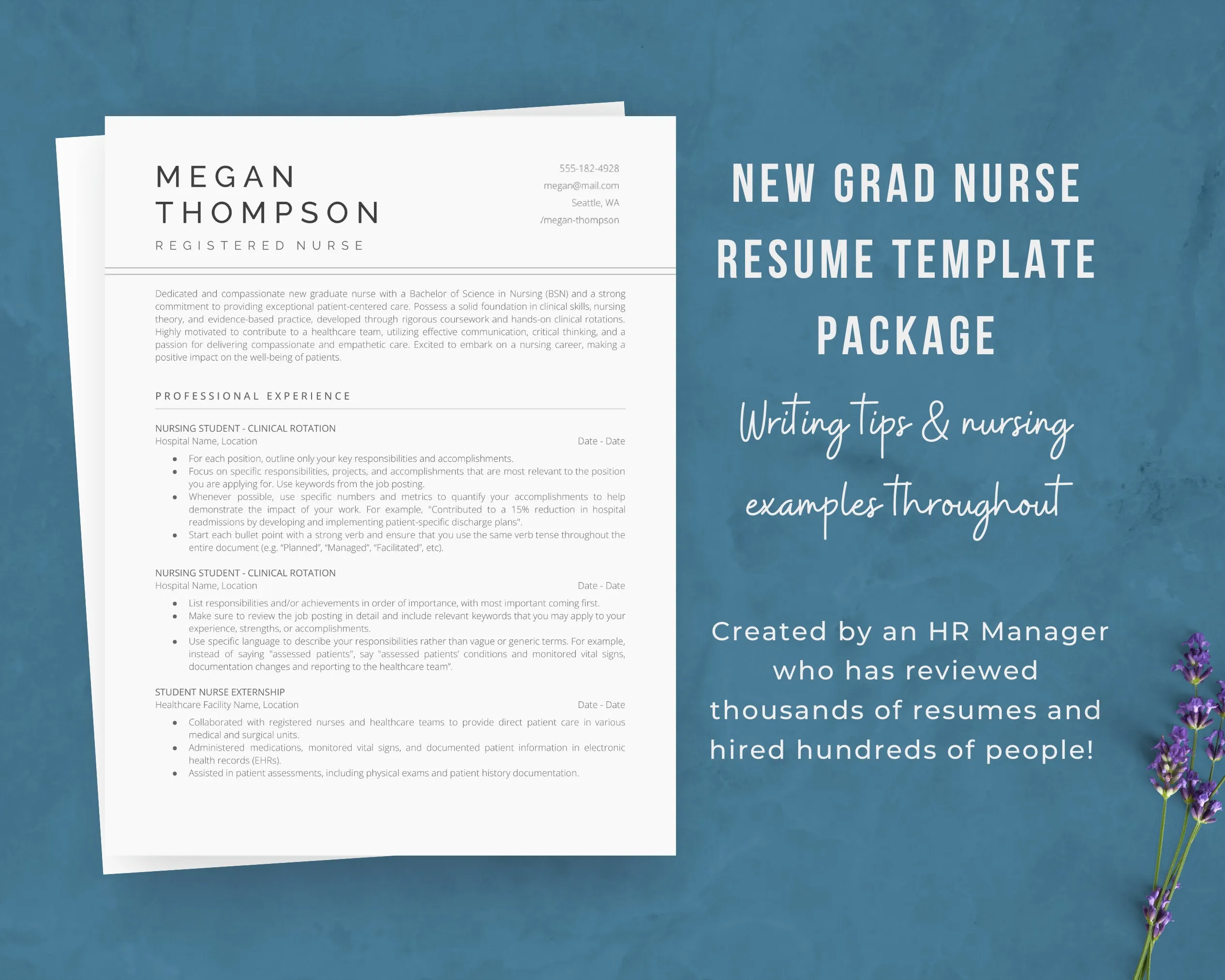
Start with your full name, phone number, email address, and LinkedIn profile URL (if you have one). Then, address your letter to the hiring manager or the specific person mentioned in the job posting. If you can’t find a name, use a professional greeting like ‘Dear Hiring Manager.’ Avoid generic salutations like ‘To Whom It May Concern,’ as it shows a lack of effort. Ensure your contact information is up-to-date and professional. Double-check the spelling of the recipient’s name and title, as this shows attention to detail.
Opening Paragraph
The opening paragraph is your chance to grab the reader’s attention. State the position you are applying for and where you saw the job posting. Briefly mention why you’re interested in the position and the organization. Express your enthusiasm and make a strong statement about your qualifications. Consider including a compelling sentence that highlights your key skill or a significant achievement. For example, ‘As a highly motivated new graduate nurse with a passion for critical care, I am eager to apply for the Registered Nurse position at [Hospital Name], where I can leverage my skills in patient assessment and medication administration to provide exceptional patient care.’
Highlighting Relevant Experience
Focus on your clinical rotations, volunteer work, and any other experiences that demonstrate your skills and knowledge. For each experience, describe your responsibilities, skills used, and any achievements. Use the STAR method (Situation, Task, Action, Result) to structure your examples. For instance, describe a situation where you faced a challenge (Situation), the task you were assigned (Task), the actions you took to address the challenge (Action), and the positive outcome or result (Result). This method helps you provide concrete evidence of your abilities and makes your experiences more compelling. Quantify your accomplishments whenever possible, such as the number of patients you cared for or improvements you initiated.
Showcasing Your Skills and Achievements
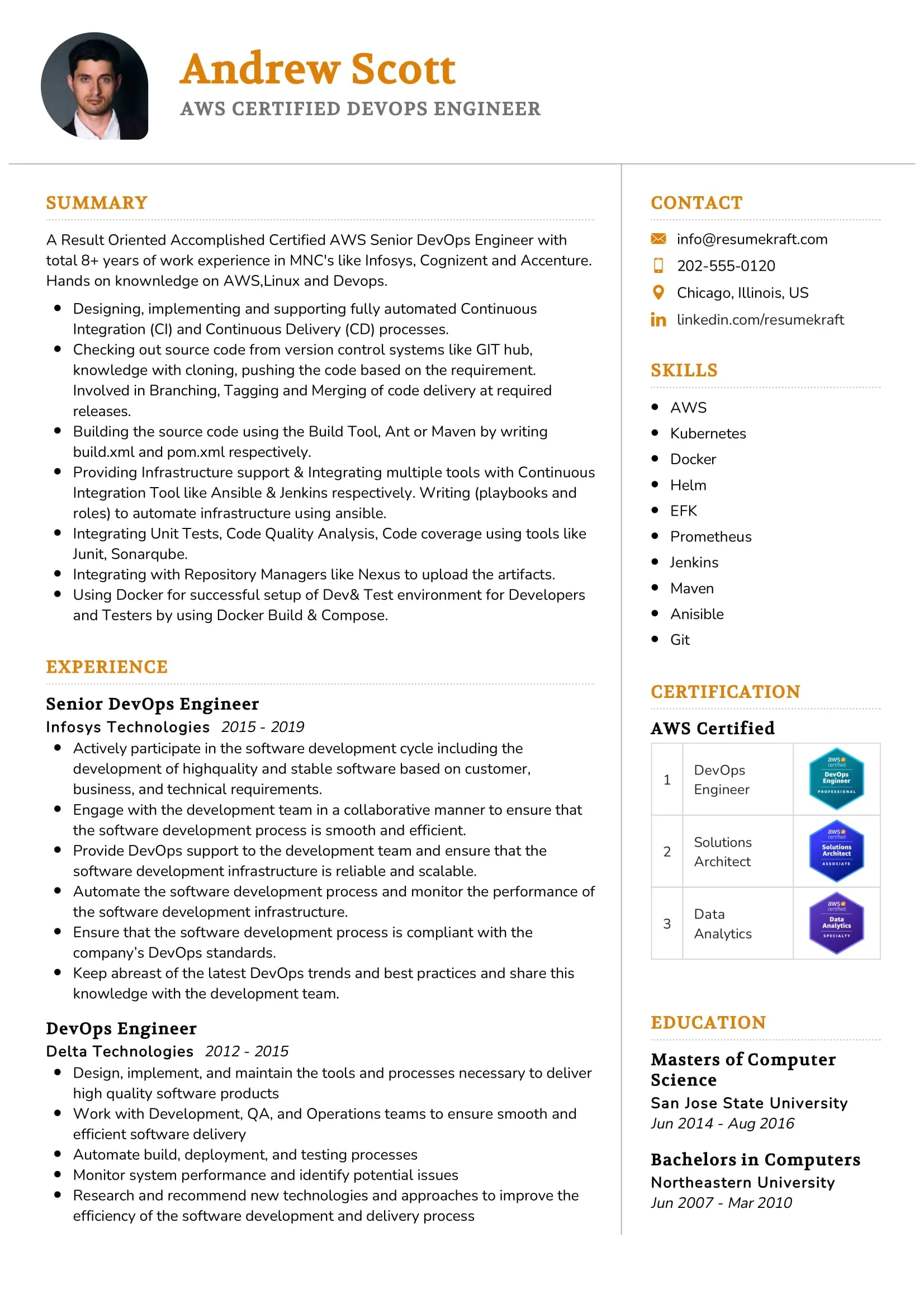
This is where you highlight your relevant skills and achievements. Use keywords from the job description and tailor your examples to match the specific requirements of the role. Mention both clinical and soft skills. Emphasize your ability to work in a team, communicate effectively, and provide compassionate care. Briefly describe situations where you used these skills to provide excellent patient care or contribute to a positive work environment. Include any certifications or special training you have, such as BLS or ACLS. Quantify your achievements and provide specific examples to demonstrate your skills and their impact. For example, ‘Successfully managed a six-patient assignment, consistently administering medications accurately and providing timely patient education, resulting in improved patient outcomes.’
Expressing Enthusiasm and Interest
Convey your genuine interest in the position and the organization. Research the organization’s mission, values, and recent initiatives. Mention specific aspects of the organization that resonate with you. Explain why you are drawn to this particular role and what excites you about the opportunity to work there. Show that you are not just applying for any job, but that you are genuinely interested in contributing to their team. Demonstrate your understanding of the organization’s goals and how your skills and experiences align with them. This enthusiasm can significantly increase your chances of getting an interview.
Call to Action and Closing
End your cover letter with a clear call to action. Express your eagerness for an interview and reiterate your interest in the position. Thank the hiring manager for their time and consideration. Include a professional closing, such as ‘Sincerely’ or ‘Respectfully,’ followed by your full name. Make sure to include your contact information again, just in case it’s separated from your header. Proofread your cover letter one last time to ensure there are no errors. Your final impression should be one of professionalism, enthusiasm, and a clear desire to contribute to the organization.
Tailoring Your Cover Letter for Each Application
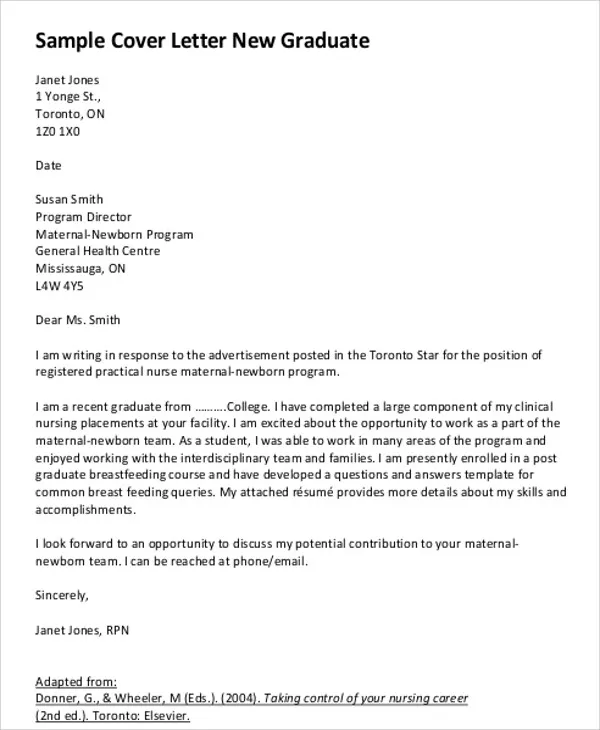
Researching the Employer and Position
Before you start writing, research the employer and the specific position. Visit the organization’s website to learn about their mission, values, and recent achievements. Review the job description carefully, paying attention to the required skills, experience, and qualifications. Understanding the organization’s culture and priorities will help you tailor your cover letter to their needs. This research is crucial for demonstrating your genuine interest and highlighting how your skills and experience align with the role’s specific requirements. Look for information on recent projects, awards, or initiatives to show you’re up-to-date.
Customizing Your Letter
Never use a generic cover letter. Customize each letter to the specific job and organization. Address the hiring manager by name whenever possible. Tailor the content to match the requirements of the job description, emphasizing the skills and experiences that are most relevant. Highlight your understanding of the organization’s mission and values and explain why you’re a good fit for their team. Show you’ve considered what the employer is looking for in a new grad nurse and have addressed each point in your cover letter. Customizing your letter shows that you are genuinely interested and have put in the effort.
Keywords and Tailoring
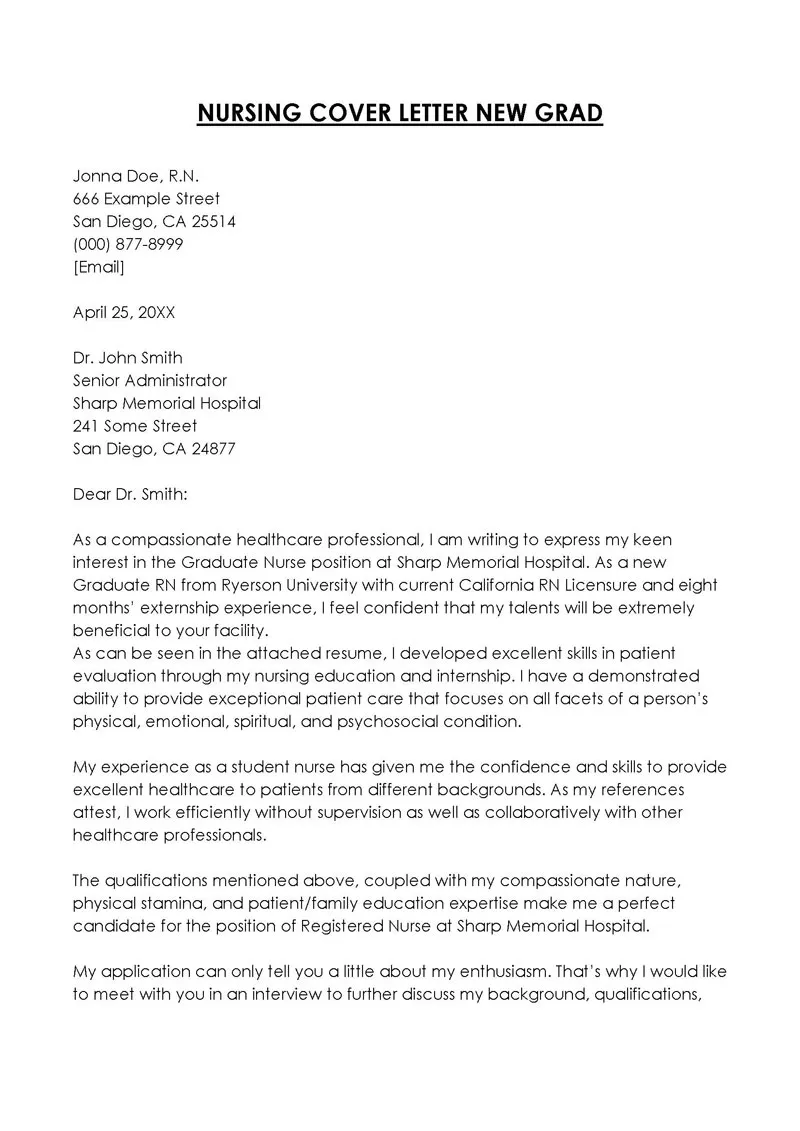
Use keywords from the job description in your cover letter to make it more relevant. Identify the key skills, qualifications, and experiences mentioned in the job posting and incorporate them into your letter. This helps the hiring manager quickly identify that you possess the required qualifications. However, don’t overdo it; ensure your letter flows naturally and remains engaging. Integrate the keywords seamlessly within the context of your experiences and accomplishments. This approach makes your letter both informative and appealing.
Common Mistakes to Avoid
Generic Templates
Avoid using generic cover letter templates that lack personalization. These letters often fail to capture the attention of hiring managers because they lack relevance to the specific role. Hiring managers can easily spot these generic letters, and they reflect poorly on your interest and effort. Instead, take the time to customize your cover letter for each application, highlighting your unique skills, experiences, and enthusiasm. Your cover letter should demonstrate your personality and your unique fit for the position, which a generic template can never achieve. Tailor your cover letter to match the job description, emphasizing the skills and experiences that are most relevant.
Typos and Grammatical Errors
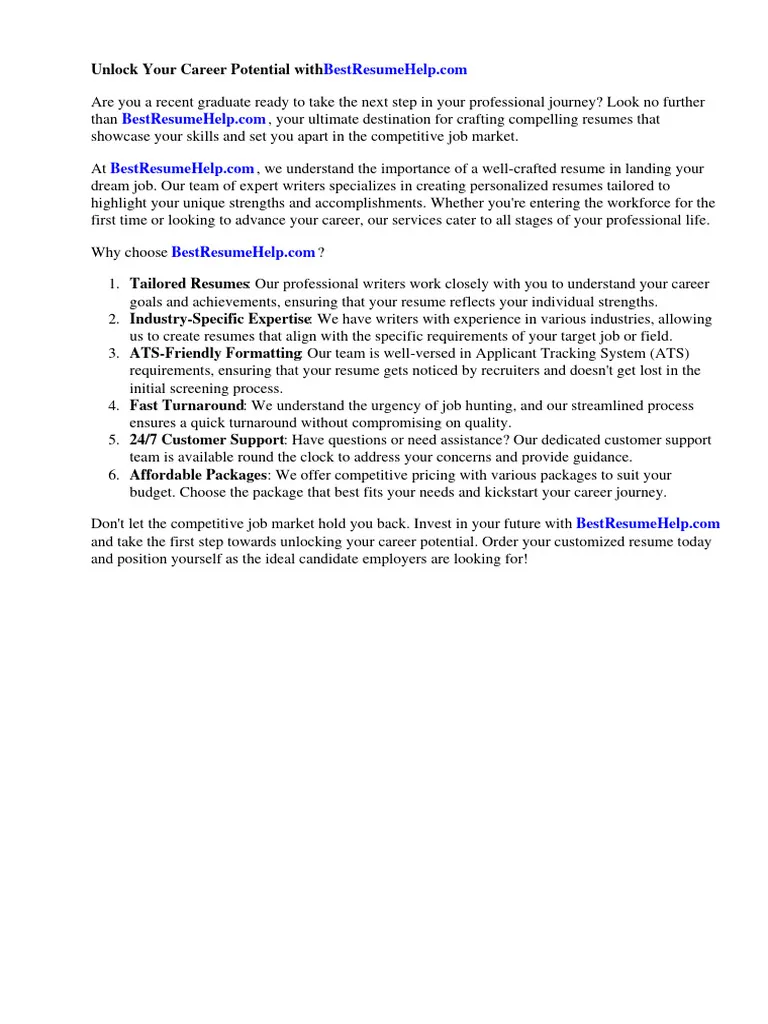
Typos and grammatical errors can make a negative impression on the hiring manager. Proofread your cover letter carefully before submitting it. Use spell-check and grammar-check tools, but don’t rely on them entirely. Read your cover letter aloud to catch any errors you might miss when reading silently. Have someone else proofread it as well, as a fresh pair of eyes can often spot mistakes you’ve missed. Attention to detail is a crucial skill in nursing, and errors in your cover letter suggest a lack of attention to detail. Always ensure that your letter is polished and free of any errors before submitting it.
Lack of Enthusiasm
A lack of enthusiasm can undermine your application. Demonstrate your passion for nursing and the specific position. Express your genuine interest in the organization and its mission. Highlight what excites you about the opportunity to work there and what you hope to contribute. Avoid sounding indifferent or apathetic; instead, show that you are excited about the prospect of joining their team and providing excellent patient care. Use strong action verbs, such as ’led,’ ‘managed,’ and ‘achieved,’ to convey your passion and commitment. Demonstrate your excitement for the position through your words and tone.
Overly Long Letters
Keep your cover letter concise and to the point. Hiring managers are busy and don’t have time to read lengthy letters. Aim for a cover letter that’s no more than one page. Focus on the most relevant skills and experiences, and avoid unnecessary details. Be clear and concise in your writing, using strong action verbs and avoiding jargon. Highlight the essential information and avoid rambling. A concise and well-written cover letter demonstrates respect for the hiring manager’s time and presents your information in a clear and organized manner.
Formatting and Presentation
Font and Readability
Choose a professional and easy-to-read font, such as Times New Roman, Arial, or Calibri. Use a font size between 10 and 12 points. Ensure your cover letter is well-formatted with clear margins, spacing, and paragraphs. This makes your letter visually appealing and easier to read. Use bullet points to highlight key skills or accomplishments. Proper formatting and a professional font make a positive impression on the hiring manager. The goal is to make the letter easy to scan and digest.
Professional Tone
Maintain a professional and respectful tone throughout your cover letter. Avoid slang, jargon, and overly casual language. Use formal language and address the hiring manager appropriately. Your cover letter is a professional document, and your language should reflect that. Ensure your writing style is appropriate for the healthcare environment. It showcases your attention to detail, which is extremely important in nursing. Proofread your letter for any informal language or unprofessional tone.
Proofreading and Editing
Thoroughly proofread and edit your cover letter before submitting it. Check for spelling, grammar, and punctuation errors. Use spell-check and grammar-check tools, but don’t rely on them entirely. Read your cover letter aloud to catch any errors you might miss when reading silently. Have someone else proofread it as well, as a fresh pair of eyes can often spot mistakes. A well-proofread cover letter demonstrates attention to detail, which is crucial in the nursing profession. Ensure your final document is polished and free of errors. Proofreading is one of the most important steps in the cover letter writing process.
Writing Tips
In addition to the above guidelines, here are a few more writing tips to help you create an outstanding cover letter. Use strong action verbs to describe your accomplishments and skills. Be specific and provide examples to illustrate your abilities. Use the STAR method to structure your responses and provide concrete evidence of your abilities. Tailor your letter to the specific requirements of each job. Proofread your cover letter and ask someone else to review it. By following these tips, you can create a cover letter that showcases your potential and helps you land your first nursing job. Remember to be confident, enthusiastic, and always professional. Good luck with your job search.
